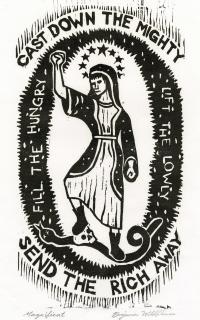Magnified
By Laura Dobson
“And Mary said, ‘My soul magnifies the Lord, and my spirit rejoices in God my saviour, for he has regarded the low estate of his handmaiden. For behold, henceforth all generations will call me blessed; for he who is mighty has done great things for me, and holy is his name…’”
—Luke 1:46–55 (The Magnificat)
The Magnificat is a courageous and subversive song of praise. In the time of Jesus, Mary's homeland was occupied by the Roman empire: a brutal military regime. Both the Roman and Jewish cultures were deeply patriarchal; this world was not a safe place for Mary or her baby, even within her own community. It must have taken great courage for Mary to say yes to what God asked of her.
Dietrich Bonhoeffer, a German theologian who was killed by the Nazis in 1945, preached a sermon on the Magnificat during Advent in 1933—the year Hitler came to power. The sermon begins:
“This song of Mary's is the oldest Advent hymn. It is the most passionate, most vehement, one might almost say, most revolutionary Advent hymn ever sung. It is not the gentle, sweet, dreamy Mary that we so often see portrayed in pictures, but the passionate, powerful, proud, enthusiastic Mary, who speaks here… a hard, strong, uncompromising song of bringing down rulers from their thrones and humbling the lords of this world, of God's power and of the powerlessness of men [sic].”

Magnificat by Ben Wildflower
Philadelphia printmaker Ben Wildflower has granted permission for his art to be used in non-profit settings like Braver/Wiser.
Mary's words were considered so subversive that they were banned by at least three oppressive regimes. During the British occupation of India, the authorities banned the recitation of the Magnificat at Evensong. In 1970s Argentina, the Mothers of the Disappeared put the words of Mary's song up on posters in the capital plaza, prompting the military junta to ban its public display. In 1980s Guatemala, Mary's song inspired the poor to believe that change was possible through non-violent resistance, and their government banned its public recitation.
Mary's song calls us to resist the forces of oppression in our own time. The Magnificat is a call to social justice. It takes courage to make ourselves vulnerable enough to feel the pain of another. It takes courage to rise up against the powerful on behalf of the exploited, the marginalized, those in our communities whose daily lives are adversely affected by unjust systems and institutions.
It takes courage to embody the beloved community, sustained by love and compassion for all. It takes courage to say yes to God; to let love in; to be transformed by it.
Prayer
May we have the courage to embrace holy anarchy and let love turn our lives upside down this Christmas.